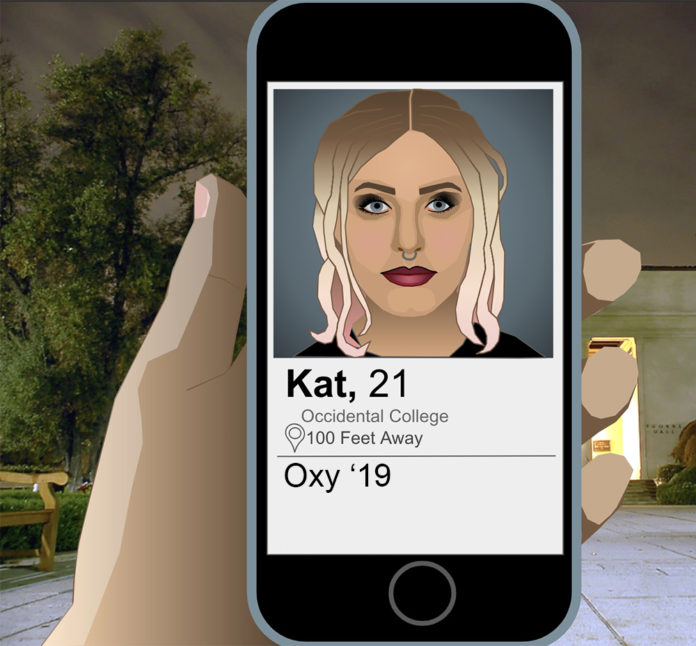At the end of my senior year of high school, I was dating a guy named Jack from my local college. I told my parents his name was Alex and we had met working together at Target. Jack was a sandy blond surfer from Florida majoring in psychology. We went on dinner dates and had great conversations. There wasn’t anything wrong with Jack –– other than the fact that I met him on Tinder.
I didn’t want to tell my parents. They grew up in a generation where people swept each other off their feet in person, and I didn’t feel like arguing against the stigma of online dating. My mom asked about “Alex” up until the day he left to go home to Florida for the summer. One day, I was tired of lying. “He won’t have a last shift because he never worked at Target. Also, his name is Jack, and I met him on Tinder,” I told her, opening a can of worms I still have not resolved to this day.
I had my fair share of experiences with online dating. Contrary to the stereotype that it cannot provide meaningful relationships, I’ve had lots of wonderful dates and met amazing people. I’ve cooked dinner, gone kayaking, seen sunsets at Griffith Observatory and dated people for several months, all using Tinder.
Another stereotype we hear is that the only purpose of online dating is to encourage hooking up. Contrary to popular belief, people have been hooking up for ages –– and they’ll continue to do so with or without dating apps. Tinder does promote casual sex and hookup culture, but that doesn’t have to be a bad thing. Many criticize college hookup culture through slut-shaming, and dating apps like Tinder certainly shouldn’t come at the expense of women’s empowerment and sexual liberation.
Lisa Wade, a professor at Occidental and author of the book “American Hookup,” articulated in an interview with Broadly that behaviors like hooking up should not be taboo. Instead, it’s most important to maintain healthy and respectful relationships with each other, no matter the type of engagement. When we oppose hookup culture, it reinforces societal stigma instead of promoting healthy relationships.
I am, however, becoming more critical of online dating apps. It’s not because I’m cynical of hookup culture, or because I believe the stereotype that it cannot offer a deep connection. I’m critical because Generation Z’s need for instant gratification has affected our ability to cultivate relationships and address serious conflicts. Access to technology and the world of online dating apps makes it easier for us to initiate relationships, but it also hinders our ability to provide closure. In this era, we have the technological prowess to end relationships without in-person communication: all we have to do is ghost someone, swipe left or leave a conversation abruptly. The surge of technology in relationships has contributed to the attitude that we can end things impersonally.
This introduces a greater point about how technology affects our ability to be upfront with people. The deindividuation of the internet — in other words, the loss of self-awareness and responsibility that we experience online — allows people to exist without personal accountability. That’s part of the allure of online dating. But it also leads to ghosting, poor communication and objectification. The ability to avoid someone with a simple swipe of our fingertips makes this kind of behavior seem normal and acceptable.
Dating apps like Tinder also cause us to see people as commodities. When we use apps to date in the same way we’d use them to buy shoes, find new movies or mindlessly search, we depersonalize the people we interact with. Most of us have been ghosted or objectified in one online interaction or another. Many of us have experienced the pain of an online fling ending without closure.
We are losing the ability to respectfully communicate with one another. Yes, dating apps can provide accessible ways to meet people, but they can’t replace real interactions. We must talk to each other in person when it comes to emotional vulnerability, and we should hold ourselves accountable for our words and actions online. The way we end relationships is as important as the way we initiate them. When we use online communication for serious conversation, it makes those conversations seem less serious and valid.
I’ve dated lots of people since Jack who I’ve met online and in person. The way I meet them is not necessarily important for me; it’s the dates we go on, the memories we share and the personal connection we have that I remember. We should not be concerned with the way we initiate our relationships, but how we chose to cultivate, respect and end them.
Maddie Solomon is an undeclared first year. She can be reached at solomonm@oxy.edu.
![]()































